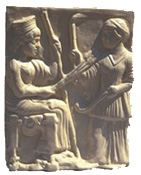
Home
Faith Index
Mother Goddess
The Modern Gaia Theory
Witchcraft
Occultism

Demeter
 The Greek earth goddess, who brings forth the fruits of the earth, particularly the various grains. She taught mankind the art of sowing and ploughing so they could end their nomadic existence. Demeter was the goddess of planned society. She was very popular with the rural population. As a fertility goddess she is sometimes identified with Rhea and Gaia.
The Greek earth goddess, who brings forth the fruits of the earth, particularly the various grains. She taught mankind the art of sowing and ploughing so they could end their nomadic existence. Demeter was the goddess of planned society. She was very popular with the rural population. As a fertility goddess she is sometimes identified with Rhea and Gaia.
In systematized theology, Demeter is a daughter of Cronus and Rhea and sister of Zeus by whom she became the mother of Persephone. When Persephone was abducted by Hades, lord of the underworld, Demeter wandered the earth in search of her lost child. During this time the earth brought forth no grain. Finally Zeus sent Hermes to the underworld, ordering Hades to restore Persephone to her mother. However, before she left, Hades gave her a pomegranate (a common fertility symbol). When she ate from it, she was bound to spend a third of the year with her husband in the infernal regions. Only when her daughter is with her, Demeter lets things grow (summer). The dying and blossoming of nature was thus connected with Demeter.
 In the Eleusinian mysteries, Demeter and Persephone were especially venerated. When she was looking for her daughter, in the shape of an old woman called Doso, she was welcomed by Celeus, the king of Eleusis (in Attica). He requested her to nurse his sons Demophon and Triptolemus. To reward his hospitality she intended to make the boy Demophon immortal by placing him each night in the hearth, to burn his mortal nature away. The spell was broken one night because Metanira, the wife of Celeus, walked in on her while she was performing this ritual. Demeter taught the other son, Triptolemus, the principles of agriculture, who, in turn, taught others this art. In Demeter's honor as a goddess of marriage, women in Athens, and other centers in Greece, celebrated the feast of Thesmophoria (from her epithet Thesmophoros, "she of the regular customs"). Throughout Classical times members of all social strata came from all parts of the Mediterranean world to be initiated in and celebrate her Mysteries at Eleusis.
In the Eleusinian mysteries, Demeter and Persephone were especially venerated. When she was looking for her daughter, in the shape of an old woman called Doso, she was welcomed by Celeus, the king of Eleusis (in Attica). He requested her to nurse his sons Demophon and Triptolemus. To reward his hospitality she intended to make the boy Demophon immortal by placing him each night in the hearth, to burn his mortal nature away. The spell was broken one night because Metanira, the wife of Celeus, walked in on her while she was performing this ritual. Demeter taught the other son, Triptolemus, the principles of agriculture, who, in turn, taught others this art. In Demeter's honor as a goddess of marriage, women in Athens, and other centers in Greece, celebrated the feast of Thesmophoria (from her epithet Thesmophoros, "she of the regular customs"). Throughout Classical times members of all social strata came from all parts of the Mediterranean world to be initiated in and celebrate her Mysteries at Eleusis.
In ancient art, Demeter was often portrayed (sitting) as a solemn woman, often wearing a wreath of braided ears of corn. Well-known is the statue made by Knidos (mid 4th century BCE). Her usual symbolic attributes are the fruits of the earth and the torch, the latter presumably referring to her search for Persephone. Her sacred animals were the snake (an earth-creature) and the pig (a symbol of fertility). Some of her epithets include Auxesia, Deo, Chloe, and Sito. The Romans equated her with the goddess Ceres.